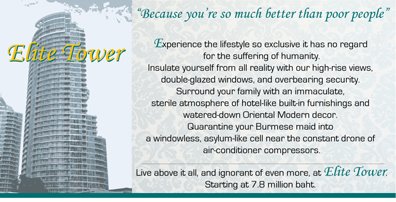BANGKOK — In a bittersweet ceremony commemorating the 20th anniversary of the Tak Bai massacre, Thailand’s government marked not only the tragic loss of life but also the officially sanctioned expiration of any hope for justice. The statute of limitations on all criminal charges relating to the massacre quietly expired last week, bringing a legally mandated end to decades of finger-pointing, report-drafting, and, ultimately, nothing much at all.
The anniversary comes on the heels of failed lawsuits, evaporated charges, and the mysterious absences of key defendants, several of whom “took leave” and conveniently vanished just in time to evade any formal accountability. Observers describe the final days as a “chaotic festival of creative disappearing acts,” with one official, Wissanu Lertsongkram, even returning to work in a new district role just after the case expired, sparking public outrage and fueling speculation that his sudden exit had been carefully timed.

Government to Public: Lower Your Expectations
In an unprecedentedly honest statement, the Thai government warned citizens not to “overburden themselves with hopes of accountability,” especially from figures with connections to the state. “Thailand is a land of smiling tolerance,” said an unnamed government spokesperson. “This extends to powerful individuals who may or may not have authorized terrible things in the past. Remember, sometimes justice is best left as a fond, unachievable memory.”
The spokesperson elaborated, “There were ample opportunities to take decisive action in the Tak Bai case, but in hindsight, officials preferred to adopt a ‘wait-and-expire’ approach. This avoids the nasty complications of trials and accountability, which frankly, are not very good for morale.”

Statute of Limitations Expires on Cue, as Key Defendants Return from Strategic Disappearances
Among the case’s defendants, former military truck driver Wissanu Lertsongkram has returned to his district role the morning after the statute expired, igniting public outrage. Wissanu, who took a leave of absence just days before charges were issued, quietly resumed his post as assistant district chief with no disciplinary action. The Interior Ministry confirmed that Wissanu’s absence was within policy limits, which prohibit dismissal for absences shorter than 15 days. “Technically, everything is above board,” an official remarked.
A Culture of Impunity—and Some Suggested Reading Materials
In response to mounting public anger, the government has promised a new “introspection workshop” for state officials on how to handle future, similar situations. Scheduled for next spring, the workshop will feature such classes as Knowing When Not to Pile Protesters into Trucks and Effective Leave Requests: Timing is Everything. “We believe these courses will equip officials to manage high-tension situations more diplomatically—or, at the very least, prepare more plausible exits when things go sideways,” the government spokesperson added.
Senate Committee Promises “Thorough Review” Before Not Doing Anything
For families and activists, the case’s expiration feels like a gut punch. Many believe the authorities’ failure to bring defendants to justice will embolden insurgent groups and further destabilize Thailand’s deep south. Senator Angkhana Neelapaijit, chairwoman of the Senate committee on political development, noted that the case highlighted a “deeply ingrained culture of impunity” among Thai officials. “Our committee will issue a report with recommendations that we’re confident will be taken very seriously by no one,” she said. “But we must do it anyway because, frankly, it’s tradition.”
Critics have responded by calling for legal reforms to extend the statute of limitations on such cases, arguing that state officials’ proven talent for “strategic absences” makes the current system ineffective. “By the time any meaningful action is taken, most officials will have retired—or conveniently disappeared,” one critic pointed out. A popular suggestion is that Thailand follow a “rolling statute” model in which the limitations period resets whenever anyone tries to dodge responsibility. However, officials have expressed concern that such a system would lead to “overwhelmingly high” levels of actual accountability.
The Case that Vanished Along with Key Defendants
The symbolic end of the Tak Bai case may have repercussions in Thailand’s deep south, where locals already skeptical of the government’s commitment to peace have grown even more disillusioned. Observers fear the expiration of the case will give rise to further unrest, with insurgent groups seizing on the incident to drum up support. “Justice delayed is justice denied,” said Kamolsak Leewamoh, MP for Narathiwat. “The expiration of this case represents not just an oversight but a total breakdown of public trust in the system.”
Yet, government officials remain undaunted. “The Thai justice system operates within its unique rhythm,” a high-ranking judge commented. “If some defendants happen to escape by default, we take it as a sign from the universe that everything is as it should be. After all, laws are best when selectively applied.”
Justice Put to Rest, But Not Forgotten
For now, the 20-year mark of the Tak Bai massacre serves as a reminder of Thailand’s unique approach to accountability. As one protester at a memorial vigil put it, “In other countries, the powerful are held to account, or at least they’re made to answer difficult questions. Here, we honor them by letting them quietly fade away, free from the stress of responsibility.”
With a final commemorative bow, officials assured the public that the lessons of Tak Bai would be preserved—quietly, discreetly, and just out of reach of actual justice. As Deputy Accountability Officer Prakit Pongjak concluded, “It’s not that we forgot. We simply decided that some things are better left unresolved. And that, after all, is the Thai way.”
See our previous coverage of the Tak Bai Massacre here


